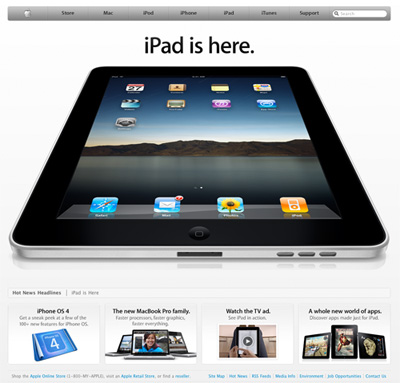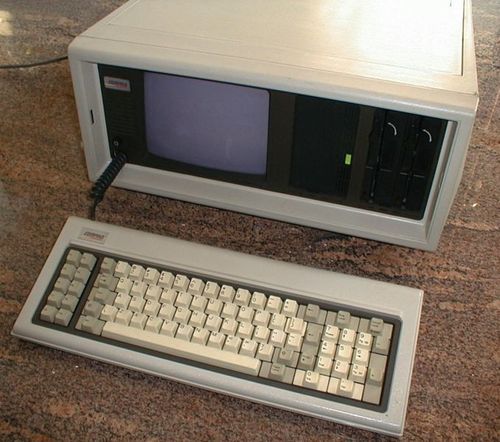New MacBook Pr—OH LOOK, AN IPAD!
This morning, Apple updated the MacBook Pro line with new internal components, including new processors, new graphics chips, a higher-resolution screen option on the 15” (finally), and bigger batteries.
This is usually significant news worthy of a homepage takeover for a week. But today, as Marc noted, the Apple homepage looks like this:
The new notebooks are relegated to a small promo unit along the bottom of the huge iPad graphic.
The message is clear: Macs aren’t Apple’s focus right now. This will be sad news to a lot of people, but I’m quite happy about it.
Computers are boring.
New applications can improve our lives. New form factors can be revolutionary. New networks and services can increase communication and enrich relationships. But the steady progress of CPU power and storage in personal computers doesn’t do much for me anymore. Today’s MacBook Pro encodes video faster than yesterday’s MacBook Pro, but how many people encode video? Today’s MacBook Pro plays high-end 3D games faster than yesterday’s MacBook Pro, but how many Apple buyers play high-end 3D games?
By comparison, to how many people might the iPad — a brand new form factor with a brand new OS, new interface paradigms, and new applications — be relevant and exciting?
Mac OS X 10.6, Snow Leopard, was released last fall. Nearly everything I do on my computer was unaffected by its changes in a user-noticeable way. There were very few compelling reasons for most people to upgrade.
My Mac Pro (admittedly a ridiculously awesome computer) is two years old. I have absolutely no reason to buy a new one as long as it keeps working. The Mac Pro lineup will be updated to the 6-core Westmere-series Xeons any day now, but I don’t need them, because my computer is fast enough already. And if I start hitting speed bottlenecks in the next year or two, they’re more likely to be alleviated by upgrading to SSDs, not replacing the whole computer.
If your CPU power dropped by 75% for an hour every day, how long would it take you to notice?
How much of what you do on your $1500–3000 computer could be accomplished on a $500 iPad?
John Gruber, last week:
Mac OS X 10.7 development continues, but with a reduced team and an unknown schedule.
I read this and wasn’t disappointed or scared at all. I’m very happy with 10.6. I was very happy with 10.5.
What do you want out of 10.7?
I use desktop computers for many hours every day. They are my profession, my hobby, and my leisure. But the pace of their software innovation that’s relevant to my everyday use has dramatically slowed. It’s not a bad thing. On the contrary, it’s great that I don’t need to constantly update and upgrade everything to maintain a stable, full-featured computing environment. This is what mature, stable products and industries are like. They work, and they’re built on decades of progress, but modern advances are infrequent and incremental.
Mobile and tablet computing are immature and unstable. Major revolutions still occur frequently. We still haven’t figured out how this stuff all works or what we can do with it. Mobile computing just started. Mobile computing is, today, where portable computing was in 1983.
Desk computers1 aren’t going away anytime soon. I’d be surprised if they went away during our lifetimes.
A desk computer is a general-purpose tool. That’s what makes them so great: they can do a massive variety of tasks, even if they weren’t designed to do them when they were made. People will always need them.
But specialized tools will continue to eat away subsets of what desk computers do, and now that desk computers have reached long-term maturity, the specialized tools are far more interesting to most people.
-
I don’t know if “desk computers” is a real term. Now it is. It’s what you’d expect: the unified category to include today’s desktops and laptops, and any obvious relatives. Computers that work best, or exclusively, at a desk. Laptops, iMacs, Dell crapboxes. Nearly anything that you’d call a “computer” today. I’d even include netbooks and any tablet-shaped laptop that runs Windows Tablet PC Edition. They’re what most people have been calling “personal computers”, but that’s a terrible term.
Not included: smartphones, iPad, JooJoo (LOL), Nokia’s tablet things, iPods touch, and probably most future devices based on Chrome OS, Windows Series 7 Phone Series Windows, or iPhone OS. ↩︎

